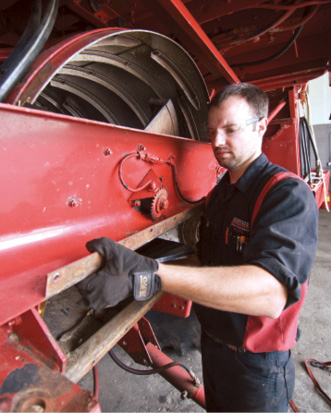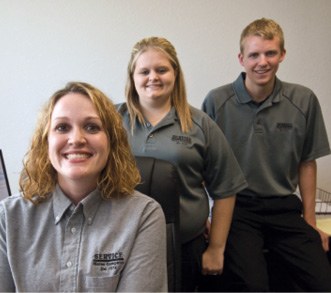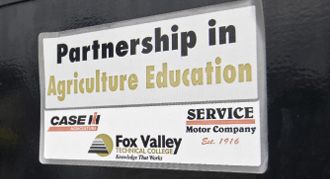Not only does Service Motor want to develop the talent it needs, but it also aims to show the younger generation that there's a solid future in agriculture
"We look at these programs as an investment in the future," says Jim Sommer, president of Service Motor.
What keeps farm equipment dealers up at night can change with the seasons. But the one concern that can always be found at the top of their worry list is attracting and keeping talented, qualified employees.
It’s been a front-of-mind issue for Service Motor Co. for nearly four decades. But for this Case IH dealership group it goes beyond hiring the best-qualified employees it can find. It’s as much about improving the image of agriculture with young people who are vital to the future growth of the industry.
A partnership between the Wisconsin equipment dealer, Case IH and Fox Valley Technical College (FVTC) aims to supply the industry with a pool of highly skilled candidates trained to work with the latest technology. At the same time, this program alerts young people to the diverse opportunities in an industry that some may dismiss as an “un-cool,” dead-end career path.
Kevin Sommer, Service Motor vice president of sales, says, “One of the goals of this program is to show students that the agriculture industry is vibrant and growing. We try to recruit them at a young age and steer them in a direction where there are good, paying future jobs.”
A true partnership benefits everyone involved. Case IH supplies equipment to Service Motor, who sets up and delivers the machines to FVTC. Students get hands-on experience with the newest technology, such as GPS and telematic devices. In this win-win scenario, technical colleges open the eyes of students to opportunities in the industry for dynamic, rewarding careers. Case IH increases its market potential with an expanded base of young people familiar with its equipment and technology, and Service Motor can fill employment vacancies by choosing from a large base of candidates who are already trained.
Long-Term Relationship
Service Motor has been working with FVTC’s agriculture and diesel mechanic programs for nearly 40 years. About 30 years ago the equipment dealer began loaning equipment to the school for students to work on. Later, company representatives were named to the curriculum advisory board. In the last year, Service Motor donated $1.1 million to the college for scholarships, equipment and the expanded agriculture center.
Service Motor Co.
Dale, Wis.
Founded: 1916 by Antone Sommer
Customer base: Primarily dairy farms with some vegetable farms, mostly potatoes
Locations: 6 (Dale, Green Bay, Seymour, Fond du Lac, Stevens Point and Wausau, Wis.)
Mainline: Case IH
Other lines: Case Construction, Kubota, JCB, Claas, Miller, Gehl, Kinze, Kuhn, Landoll, Land Pride, Meyer, Thunder Creek, Vermeer, Woods
Employees: 150
2013 Revenue: $82,000,000
“We believe this program is incredibly important,” Sommer says. “We want to be an industry leader, and we want students to think of Case IH and Service Motor Co. Our industry is aging, and we are going through a youth movement. Going forward, agriculture needs skilled workers who embrace technology. At FVTC, students are able to get their hands on what’s coming right off the assembly line.”
FVTC president Dr. Susan May says the equipment and support from Service Motor and Case IH allow the school’s programs to excel.
“Everyone wins, especially in the development of human talent,” she explains. “The agriculture industry is an older sector, often misunderstood by young people. There are a wide variety of opportunities; it’s not just about being a ‘farmer.’ The levels of precision required for crop production require a high level of technology. There is a broad spectrum of opportunities, including service and parts technicians, crop specialists, research and development techs, as well as jobs in horticulture and landscaping. It is a field made for students interested in computer technology.”
Wide-Ranging Partnerships
Case IH and Fox Valley Technical College (FVTC) aims to supply the industry with a pool of highly skilled candidates trained to work with the latest technology.
Service Motor also works with North Central Technical College, Northeast Wisconsin Technical College and six Univ. of Wisconsin agriculture research stations. The schools submit equipment requests to the dealer, who then orders equipment from Case IH. Service Motor sets up and delivers the units, and picks them up at the end of the season for resale at one of the company’s six locations.
The schools receive everything from compact and large tractors to planters, combines and tillage equipment. Teaching can literally be done in the field with the latest technology. The cost of a combine with corn and bean heads, a planter and a tractor to run them can easily cost more than $750,000. The savings to school budgets is enormous.
FVTC associate dean Mike Cattelino says it’s hard to put a monetary value on the partnership.
“At its roots, this program is about relationships,” he explains. “For Case IH to partner with a technical college is unique. When they reached out, Service Motor immediately responded to us. We benefit from the technology, and try to return the favor by offering highly trained and qualified students.”
Each year, the schools get the newest equipment. Students are up to date on Tier 4 engine compliance, guidance systems and GPS technology, for example.

After graduating from FVTC, Justin Neuman accepted a service technician position at Service Motor, where he specializes in combines and tractors.
“The best part is that they get this exposure from the operator’s seat,” Cattelino says. “Our students have assembled a turbo disc and installed dual tire systems. This is a great learning opportunity and important to education as a whole. It would be difficult for us to keep up with new technology. A combine with two heads would cost us $500,000, and we’d have to hang on to it for 10 years. Our students would miss out on annual updates. We typically get offers for old equipment, but from an educational standpoint it doesn’t do us any good.”
Success Stories
Justin Neuman grew up on a farm in Wisconsin’s Fox Valley. When he graduated from FVTC, he accepted a service technician position at Service Motor, where he specializes in combines and tractors. According to Neuman, there is no substitute for working hands-on with new equipment in the field.
“I could sit in a classroom all day,” he says, “but the best way to learn is to play around with equipment in the field. In fact, at FVTC, one of the final exams is about how to set up a combine.”
At Service Motor, Neuman’s training is ongoing. Technicians attend classes in new equipment and technology at Case IH’s facility in Racine, Wis.
“Our company handles a lot of equipment, so there are many opportunities to specialize,” he says. “The agriculture industry keeps growing, and even in our part of the country we’re seeing more big farms. Equipment will only get more technical.”
Service Motor has hired several other FVTC graduates, including accounting generalist Matt Bartelt and sales assistant Casey Miller.
This summer, Brian Lamont completed the precision agriculture technician program at FVTC. He is a specialist at Ag Systems in DeForest, Wis.
“I chose precision agriculture because it is an up and coming field,” Lamont says. “The technology is through the roof. At present, my job is installing these systems on sprayers and dry fertilizer units. The program familiarized me with several manufacturers in addition to Case IH. It was really cool to be able to work with the latest technology.”
Lamont’s mother grew up on a farm in Pine Bluff, Wis., and he was raised in a farming community in Iowa. The industry continues to intrigue him.

Human Resources manager Angela Berge (foreground) with sales assistant Casey Miller and accounting generalist Matt Bartelt.
“I’m very happy I chose to pursue precision agriculture; it’s very interesting,” he says. “The FVTC program is run very well, and I like the varied aspects of the job, being able to work inside and outside and interact with farmers.”
Work with FFAs
Service Motor has expanded its outreach to local high schools and their Future Farmers of America (FFA) organizations. Human resources manager Angela Berge works with these groups to educate youth about opportunities in the agriculture industry. She says half the farmers in the U.S. are 55 years or older, and many young people only think of farming as back-breaking labor without an economic payoff and little room for career advancement.
“We let these students know that agriculture is a ‘hip’ industry with lots of opportunities,” she adds.
There are many advantages to a career in farming. First, individuals can run their own business. Farmers are entrepreneurs and need to have a strong business sense to keep their operations running smoothly. Cost, profit, business planning and contracts have as much impact on a farm as crops and livestock. Farmers can also divide their time between indoors and outdoors. And, there are lots of opportunities to diversify. There is the chance to develop and market niche products, set up a farm shop or generate renewable energy.
“Agriculture is a growth industry,” Berge explains. “One generation is moving out, and another is needed. The knowledge and skill levels must be brought up to speed. This year we will do presentations about our company and opportunities in different departments. It’s not just a technical field. Besides mechanics, we need personnel in parts, sales and administration. We also need individuals with great customer service and communication skills.
“If they like working with people or being on the road, there are opportunities. They can stay in the industry and not work directly on a farm. We want to talk to students before they set their career path. Having a real business person talk to them about opportunities we have right now opens their eyes tremendously.”
Service Motor has six locations. Each has a different level of involvement with local FFA groups. There are auctions, farm breakfasts and other fundraising activities to promote community involvement. A recent silent auction at a customer event brought in $10,000 to Wisconsin FFA chapters.
“More than 25% of the people in our industry will retire in the next 10 years,” Berge says. “That knowledge and skill level can’t be replaced immediately. It’s important to let people know about opportunities and ways to progress through our company.”
In Business Since 1916
Service Motor Co. started in 1916, and has been associated with Case IH the entire time. One hundred and fifty employees work for the dealership. The company also carries Kubota equipment. Starting with one store in Dale, Wis., the business has grown with locations now in Green Bay, Seymour, Fond du Lac, Stevens Point and Wausau, Wis.
President Jim Sommer represents the fourth generation and has been with the company for 38 years. Besides his son, Kevin, who works at the dealership, daughters, Kimberlee and Kara, also are vice president of operations and IT management respectively. Another son, Korey, is in the accounting department.
“One of our strengths is the ability to combine the resources of all six stores, such as parts inventory, service tools and equipment,” Jim Sommer says. “We can move around items fairly fast. To maintain our competitive edge, we emphasize training. Our 24 sales associates must be up to date on the latest technology. They go all over the U.S. for school and classes.
“Our business depends on us knowing the latest technology,” Jim says. “We have fewer customers, so we have to diversify our product offering to get new ones. There are more custom operators that do a series of farms with one piece of equipment. However, each unit is more technical with Tier 4 engines, CVT transmissions and all the sensors. Our technicians need computer training to service this equipment.”
Jim Sommer says the company’s partnership with technical colleges is vital.
“We do this to give students the training they need,” he explains. “They are exposed to technologies that they will need when they pursue industry job opportunities. The programs increase student exposure to the product and we get recognition from the community.
“It’s like advertising, but more importantly, it’s training for the next generation. We look at this program as an investment in the future. People with experience and knowledge are hard to find. We try to steer them in our direction because we have a need for good people. We have to educate students that a career in agriculture is a good, exciting and challenging livelihood, so 5 years from now we can get the employees we’re looking for.”
Kevin Sommer says Service Motor isn’t the only dealer looking for good people. Equipment manufacturers and suppliers also want highly trained and qualified individuals.
“It’s sometimes difficult to find the right candidate who is motivated and patient enough to take the time for training,” he says. “There are a lot of products and it takes time to learn them. We’ve enhanced our benefits to make us a more attractive place for job seekers. We offer scholarship and internship programs and rent-to-own tool plans. We want to be a landing spot for graduates. We’re a winning team and we do things differently to be a leader in the industry.”






